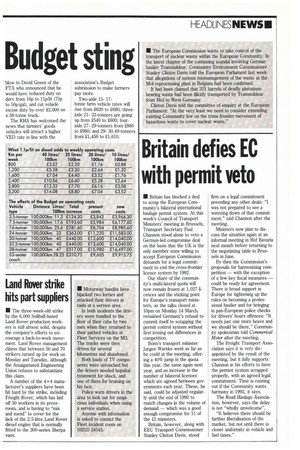Britain defies EC with permit veto
Page 7

If you've noticed an error in this article please click here to report it so we can fix it.
in Britain has blocked a deal to scrap the European Community's bilateral international haulage permit system. At this week's Council of Transport Ministers' meeting in Brussels, Transport Secretary Paul Channon stood alone to veto a German-led compromise deal on the basis that the UK is the only member state willing to accept European Commission demands for a legal commitment to end the cross-frontier licence system by 1992.
Our share of the community's multi-lateral quota will now remain frozen at 1,027 licences and the sticking point for Europe's transport ministers, as the talks closed at lOpm on Monday 14 March, remained Germany's refusal to commit itself to scrapping the permit control system without first ironing out differences in competition.
Bonn's transport minister Jurgen Warlike went as far as he could at the meeting, offering a 40% jump in the quota this year, the same again next year, and an increase in the number of bilateral licences which are agreed between governments each year. These, he said, could be adjusted regularly until the end of 1992 to match changes in the volume of demand which was a good enough compromise for 11 of the 12 ministers.
Britain, however, along with EEC Transport Commissioner Stanley Clinton Davis, stood firm on a legal commitment preceding any other deals: "I was not prepared to see a watering down of that commitment," said Channon after the meeting.
Ministers now plan to discuss the situation again at an informal meeting in Hof Bavaria next month before returning to the negotiating table in Brussels in June.
By then the Commission's proposals for harmonising competition with the exception of a few key fiscal measures could be ready for agreement. There is broad support in Europe for tightening up the rules on becoming a professional haulier and for bringing in pan-European police checks for drivers' hours offences: "It needs just one more heave and we should be there," Community spokesman told Commerical Motor after the meeting.
The Freight Transport Association says it is very disappointed by the result of the meeting, but it fully supports Channon in his efforts to have the permot system scrapped properly, with an agreed legal commitment. Time is running out if the Community wants harmony in 1992, it says.
The Road Haulage Association, however, says the delay is not "wholly unwelcome".
"It believes there should be further liberalisation of the market, but not until there is closer uniformity in vehicle and fuel taxes."
































































































